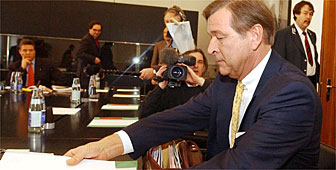Bank chiefs grilled over Swissair

The heads of Switzerland's two biggest banks have been hauled before a parliamentary committee to answer for their role in last year's Swissair grounding.
UBS’s Marcel Ospel and Credit Suisse’s Lukas Mühlemann were blamed last October for not doing enough to keep the national carrier airborne.
They had agreed a bail-out package for the collapsed airline, but the money did not come through fast enough to prevent the grounding of Swissair planes for two days.
The then Swiss president, Moritz Leuenberger, described the situation as a “disaster”, firmly laying the blame for the debacle at the banks’ door. The airline was forced to keep its planes on the tarmac because it couldn’t secure enough cash for the running of its day-to-day operations, such as fuel costs and landing fees.
Former Swissair Group boss, Mario Corti, went so far as to accuse the banks of plotting against him in a bid to limit their exposure.
Emergency cash injection
It emerged that the Swiss government and Credit Suisse had agreed to finance part of a SFr250 million emergency cash injection on October 2 to cover the cost of aircraft fuel. However, Ospel could not be reached to discuss the proposal since he was on a flight from Zurich to New York.
The suspension of flights came just 24 hours after the banks had announced a SFr1 billion ($620 million) bridging credit for the ailing airline, which had run up debts of SFr17 billion ($10.5 billion).
René Lüchinger, an aviation analyst at “Bilanz” magazine and author of “The Fall of Swissair”, said the banks had to shoulder a great deal of responsibility for the grounding of the Swissair fleet.
He said the decision by UBS to cut off a vital cash supply on October 1, coupled with the failure to secure the emergency bridge loan the following day left the airline stranded.
“The banks have to take some of the responsibility because they wanted to sell off Crossair from the Swissair Group and were not interested in saving the old Swissair,” Lüchinger told swissinfo.
“If they had said then that they would put SFr500 million into the Swissair Group then the grounding would not have happened.”
In a statement on Monday, Mühlemann denied any responsibility for the grounding, arguing that Credit Suisse had made “every possible effort” to prevent it.
UBS also refused to accept any blame, stating that the crisis came about as a result of the airline’s “huge debt mountain, a failed acquisition strategy and operating losses”.
Debt-laden airline
According to Lüchinger, both the government and Corti were also far from blameless for their roles in the fiasco. He said the government could have acted on its own and offered a short term loan, while Corti was guilty of failing to restructure the debt-laden airline quickly enough.
“It’s a combination of everything, including bad communication between the three parties,” he said.
The committee declined to comment on Monday’s hearing. The full results of its inquiry into the collapse of Swissair are expected to be published at the end of June.
The government and Swiss businesses eventually put together a SFr2.7 billion recapitalisation plan for Crossair to relaunch a new national carrier, under the name “swiss”, on April 1.
by Adam Beaumont with agencies

In compliance with the JTI standards
More: SWI swissinfo.ch certified by the Journalism Trust Initiative
You can find an overview of ongoing debates with our journalists here. Please join us!
If you want to start a conversation about a topic raised in this article or want to report factual errors, email us at english@swissinfo.ch.